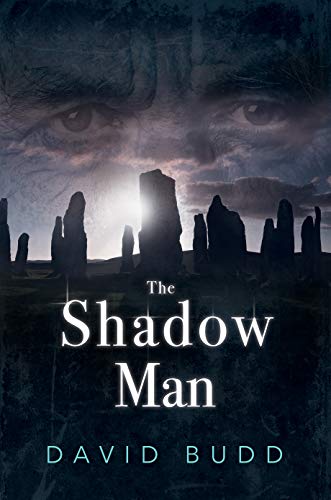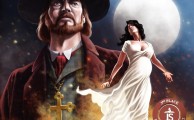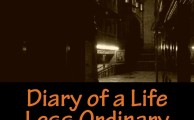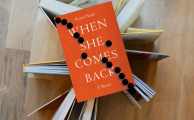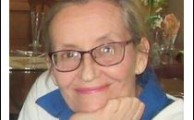David Budd Interview
Indie Book Butler: Today we are joined by David Budd, author of The Shadow Man.
1. IBB: Can you tell us a little about yourself?
I’m currently in lockdown in Edinburgh where I’ve been living for 9 months. Before that I lived in Manchester where I worked for the BBC as a Radio Studio Manager for 5 live. I now work as an Editorial Assistant for Floris Books, an independent publisher that publishes fiction for children and young adults, as well as non-fiction dealing with the work of Rudolf Steiner and Anthroposophy. Those are the books that I work on. I’ve moved around a bit both in terms of my career and where I’ve lived.
I’ve had an interested in writing and storytelling for almost as long as I can remember. I was around 7 or 8 years old when I first thought this was something I would like to do, so to finally have a book published is fantastic.
2. IBB: Your debut novel is The Shadow Man – can you fill in our readers on the book?
The Shadow Man is a dark fantasy novel about teenage twins Faith and Thomas Loxley who belong to a small group of travellers, and Stephen Banks, a teenager from the local town who finds himself drawn into their world after meeting Faith, Thomas and several other travellers on a night out. We learn at the beginning that from an early age, Faith and Thomas have a special connection to nature that makes aware of the various unseen spirits that inhabit the natural world, it also gives them a certain control over the elements. As they have grown older this connection has grown weaker, leaving them feeling estranged and cast out from the world around them. Determined to reverse this decline, Thomas accepts the help of a gruff old man he encounters at a stone circle, but he is tricked and falls prey to a demonic power that gradually takes him over. When tragedy strikes the already beleaguered community of travellers, Faith and Stephen attempt to uncover the cause, leading ultimately to a confrontation with the evil that has possessed Thomas – the titular Shadow Man – and is now reaching out to claim Faith too.
I’d always imagined it as a story of the Fall, a tale Paradise Lost if you like, and because of the nature mysticism that runs throughout it, I wanted it to have a kind of fairy tale feel to it – but one that evoked the darker side of those stories.
3. IBB: What was behind the general idea for the story?
I’ve spent most of my life living in cities and I often feel cut off from the natural world. I wanted to write something that dealt with that feeling of alienation and how harmful it can be. It’s precisely because we have come to see ourselves as separate from the world around us that we’ve inflicted so much damage on the environment. We see nature as a resource to be used rather than something we belong to, are fundamentally part of, and need to care for. I also wanted to write about the overcoming of that alienation and a striving towards wholeness and psychological integration.
4. IBB: How did you write authentically about the traveller community?
I mostly did reading research to find out about travelling communities. New Age Travellers by Kevin Hetherington, and Travellers: Voices of the New Age Nomads by Richard Lowe and William Shaw, were particularly useful, as well as other books about communal living and new age beliefs.
I was aware that there were different types of traveller groups, but I focused on the type that emerged from a mix of the folk festival circuit, the New Age movement, and the rave scene of the late 1980s early 1990s.
5. IBB: Do you have a particular interest in the supernatural?
I’ve always been interested in horror/fantasy fiction, and although my interests encompass other forms of fiction, most of what I write and plan to write is horror/fantasy in nature.
6. IBB: How did you find the process of balancing horror with writing a young adult novel?
When I wrote the book I didn’t have a young adult audience particularly in mind – even though the main characters are teenagers – so finding the right balance with the horror elements wasn’t a consideration for me at the time. It was only when I submitted the book to Otranto House years later that it was decided some of the content needed to be toned down. As part of the corruption that takes hold of Thomas, he begins to develop feelings for Faith that a brother really shouldn’t have for his sister (I was going for the full Gothic in my gothic fairy tale). We agreed that particular storyline should be edited out, and I was happy to do that. All of the other horror elements remained the same, barring a bit of spit and polish to the prose.
7. IBB: Did you find any challenges in the writing and publishing process?
In terms of the writing… YES!!! The whole thing was a challenge from start to finish. I threw out the first draft completely and started again. That draft had been set in a commune rather than a travelling community and had a completely different set of characters. In fact, the only three characters who survived that cull were Stephen, Faith and Thomas. The story was the same, with the same dramatic moments, but it was all reworked. Even during the later stages of the writing there were gaps in the text, and I was having difficulty writing an ending. I’m someone who does actually plan a story, but I often find that the writing of it introduces changes I hadn’t anticipated: there is a level of detail required that is obviously absent when you’re just drawing up a sketch.
By comparison, the publishing process was much easier. I had great support from the team at Otranto House and from my editors, Elizabeth Kennedy and Imogen Tomlinson, who made a lot of really helpful suggestions. I’d also like to think I’m a better writer now than when I finished the book ten years ago, so it was a good opportunity to give the writing an extra polish.
8. IBB: Where do you like to write?
At home at my desk surrounded by books.
9. IBB: Is there anything you must have in order to write?
Yes – complete seclusion. The idea of spending the day writing in a café, like J K Rowling, or with music blasting, like Stephen King, is very appealing, but unfortunately I need total quiet and complete seclusion, free from as many distractions as possible.
 10. IBB: What books have influenced you most, both as a person and as an author?
10. IBB: What books have influenced you most, both as a person and as an author?
When I was younger, I was a big fan of Stephen King and I continue to return to his work 30 years later. IT remains one of my favourite horror novels. Clive Barker, who King once described as ‘the future of horror’, was another big influence on me with books like Weaveworld, The Great and Secret Show, and especially Imajica. What Barker showed me was that it is possible to write about metaphysical and spiritual ideas without being bound by dogma and tradition. That was a huge revelation to me when I was in my mid-to-late teens.
In terms of what books have influenced me most as a person, in a way it’s every single one I’ve read. Each book has made its impact on me, each one has enlarged my world in some way great or small. If I were to single out writers who have had the most influence on me, it would be writers like Stephen King and Clive Barker, but also writers and thinkers like Rudolf Steiner, Krishnamurti and Eckhart Tolle.
11. IBB: What is the one thing that has helped you develop most as an author?
Besides the act of writing itself, I would say dogged determination and a refusal to give up – even though I’ve wanted to many times.
12. IBB: What do you want to achieve most from your writing?
I want to write good stories that people enjoy reading. But I also want to explore ideas and different points of view and to be able to express myself creatively.
Jorge Luis Borges once described a writer as someone who sets themselves the task of describing the world, only to find at the end of their life that what they have drawn is a picture of their own face. Clive Barker questioned if the opposite of this might also be true: that when a writer attempts to explore and understand themselves – to essentially create an elaborate self-portrait – what they end up doing is creating a picture of the world. It seems there is this interchange between Self and World that takes place in creative activity that can bring about a greater understanding of our own selves and others. I like the idea of engaging with that. But only if I can do so writing good stories that people enjoy reading. That’s the most important thing.
13. IBB: Is there something specific you do to improve your writing?
Yes – I keep writing. In the end that’s the only way any writer can improve. You can and should read widely, you can even read books about writing. Those are important and incredibly helpful things to do, but they are only so much theory. At some point you have to sit down and put them into practice, to work out how you’re going to do those things and tell your story. And you can only do that by writing. It takes time, patience and much effort, and it’s an ongoing process. You never stop learning.
14. IBB: What is the ideal relationship between editor and author?
It’s one of trust and clear communication. The author needs to know that the editor understands and believes in what they’re trying to achieve and feels supported by them. They must also trust that the editor will perhaps have a more objective view of what works and what doesn’t in their writing and therefore be willing to be guided by them. For the editor, patience and diplomacy are key!
15. IBB: If you had a direct line to someone who loves or hates your writing, what would you say?
Ha! That’s an interesting question, because although it would be great to have only nice things said about The Shadow Man (and so far I have had some lovely things said about it), the truth is I might learn more from sitting down and talking to someone who hated it and finding out why – as long as it was genuine constructive criticism.
To the person who loved it I would ask them what they loved about it. To the person who hated it I would take a deep breath and then ask them what they hated about it. In both cases I would thank them for taking the time to read what I’d written.
16. IBB: If you could give one piece of advice to an aspiring author, what would it be?
The advice I would give is not mine, it’s something Stephen King once said: “If you want to be a writer you must do two things above all others: read a lot, and write a lot.” I would make a small, humble addition to that and simply say: Be kind to yourself too. Writing is difficult, you don’t need to give yourself a hard time over it.
17. IBB: What does your writing future hold for you?
I’m currently working on a novel about a man who joins a religious cult and leaves after fifteen years and has to put his life back together. I’m currently on a third draft and hoping to have it finished sometime next year. After that I will be returning to the fantasy/horror genre for a couple of books or so.
18. IBB: How have you set about the task of creating enticing cover art?
I outsourced it! A few years ago I thought about publishing The Shadow Man as an eBook and got as far as commissioning a cover from a company I found online called Bespoke Book Covers. Shortly after that I became busy with my studies and forgot about it. When Otranto House agreed to publish The Shadow Man, I mentioned I’d had a cover done for it and sent it to them for their consideration. They were happy to use it.
I’m really pleased with the cover. I love the eyes staring out at you over the silhouetted image of the stone circle. So much better than some of the ideas I had originally come up with!
19. IBB: How often do you read? What genre?
I read every single day, usually for a total of 2 to 3 hours across the whole day. My reading is fairly evenly split between fiction and non-fiction. My go-to-genres tend to be horror and science fiction, although I try to read as widely as possible. In terms of non-fiction I read a lot around religion and spirituality, history, psychology and, especially in recent years, politics and contemporary culture as a way to better understand these strange times we’re living through.
Thanks for taking the time to answer our questions. Best of luck in the future.
Thank you, it’s been a pleasure.
The Shadow Man is available now on Kindle Store: HERE







